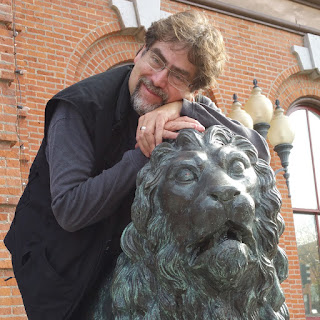 I'd like to welcome Lawrence M. Schoen to the blog. His latest novel, Barsk: The Elephants' Graveyard, is coming out this week from Tor. From Amazon and Barnes & Noble: The Sixth Sense meets Planet of the Apes in a moving science fiction novel set so far in the future, humanity is gone and forgotten.
I'd like to welcome Lawrence M. Schoen to the blog. His latest novel, Barsk: The Elephants' Graveyard, is coming out this week from Tor. From Amazon and Barnes & Noble: The Sixth Sense meets Planet of the Apes in a moving science fiction novel set so far in the future, humanity is gone and forgotten.Lawrence is a psychologist, an authority on the Klingon language, and a hypnotherapist. I asked him to write up a little something about how hypnotherapy can help authors. When I was pregnant with my son, I used self-hypnosis to cope with anxiety and with pain during labor. One of the interesting side benefits was how, while I was pregnant, my writing productivity suddenly increased. I realized it was due to my practicing hypnosis every time I sat down to write. It helped me focus, and it helped that pesky internal editor take a hike. But don't take my word for it. Here's Lawrence, discussing how hypnosis works and what it can do for writers:
Hypnosis and Writing
But it’s also incredibly powerful, and with a little coaxing you can have your unconscious do all kinds of back-breaking work in the background of your mind or while you’re asleep. Most people have had the experience of going to bed with a problem on their mind and waking up to discover the solution in front of them. With hypnosis, you can have this as a regular tool in your toolbox. Imagine laying out the questions you need to resolve in order to make a plot point work or a character’s motivations make sense, and then yawning, stretching, turning out the light, and falling asleep, secure in the knowledge that an answer will “magically” present itself in the morning when you sit down to write.
The style of hypnosis that I employ — both for myself and my clients — is often referred to as Conversational Hypnosis, or even as “Covert” Hypnosis, and is usually credited to Milton H. Erickson, the father of American Hypnotherapy (which is why it’s also sometimes called Ericksonian Hypnosis). When I began my study of this type of hypnosis I discovered it was essentially a blend of storytelling techniques and cognitive psychology. I already had my doctorate in cognitive psych, and I’d been writing and selling fiction for more than twenty years, so for me it all felt as easy as breathing. I’d already acquired all the pieces and mostly just had to assemble them in new ways.
Generally that takes the form of having a simple conversation with my clients. I especially like working with authors because they are, by definition, creative people. They’re already experienced in employing their imaginations, and a lot of facilitating change involves positing new possibilities.
It’s incredibly satisfying to help other writers “get out of their own ways.” Indeed, time and time again we find the obstacles that are keeping us from what we want are things we’ve created ourselves. At first glance, that can seem very frustrating, even hopeless, but one of Erickson’s major lessons was that each of us possesses all the resources we need to resolve any of our problems. And again, when you realize that we’re the source of them this only makes sense. This applies not just to authors, but to all of us, butcher, baker and that guy at the mall who makes candles
But part of why I especially like helping other writers to achieve their goals is because their resulting stories will go on to inspire so many others. It takes “paying it forward” to a whole new level.
***
His previous science fiction includes many light and humorous adventures of a space-faring stage hypnotist and his alien animal companion. His most recent book, Barsk, takes a very different tone, exploring issues of prophecy, intolerance, friendship, conspiracy, and loyalty, and redefines the continua between life and death. He lives near Philadelphia, Pennsylvania with his wife and their dog






























